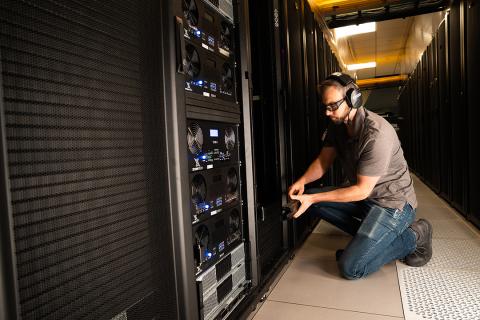Advanced Computing,
Mathematics, and Data
Advanced Computing,
Mathematics, and Data

PNNL is leading the next generation of computing for scientific discovery.
Explore our Computing & AI story
The Advanced Computing, Mathematics, and Data (ACMD) Division, led by Draguna Vrabie, focuses on basic and applied research in computing and mathematics. Our research programs are focused on intelligent systems, high-performance computing, computational mathematics, and software and data engineering. Our scientists develop and apply novel methodologies for:
- Software Engineering for Data Integration, Visualization, and Analytics
- Multi-Scale Modeling of Complex Systems
- Uncertainty Quantification
- Graph and Data Analytics
- Autonomous Machine Intelligence
- High-Performance Computing
- Domain-Aware and Physics-Informed Machine Learning
- Co-Design to Advance Computing Frameworks
Scientists and engineers in ACMD apply their expertise in mathematics, algorithms, hardware-software co-design and AI to revolutionize scientific discovery, advance computing systems, and accelerate quantum information science.
Software and Data Systems Engineering Group
Group Lead: Angela Norbeck
The Software and Data Systems Engineering group tackles the challenges associated with scientific data management, software and architecture development, and cloud computing. The group designs analytical platforms and user access portals for large and small scale data sources and distributed teams. Our scientists and engineers design and manage data flows at scale, develop web portals to access data, create interactive data visualizations, and leverage hybrid data management architectures to create robust and efficient data solutions.
Teams:
- Data Applications
- Data Systems
- Infrastructure Design
- Scientific Web Interfaces
Computational Mathematics Group
Group Lead: Panos Stinis
Our Computational Mathematics group develops and enables innovative modeling and simulation methodologies that improve the understanding of complex systems. Our core capabilities include multi-scale and multi-fidelity approaches, uncertainty quantification, scientific machine learning and discrete mathematics for forward and inverse problems. In collaboration with academia, the group has pioneered the concept of physics-informed, data-driven methods and their application to problems in challenging domains, such as subsurface transport and ice-sheet modeling. The group also leverages its modeling and simulation capabilities to develop digital twins that will guide the design and operation of next-generation energy systems.
Teams:
- Algorithms, Combinatorics, and Optimization
- Multiscale Modeling
- Scientific Machine Learning and Uncertainty Quantification
Data Sciences and Machine Intelligence Group
Group Lead: Mahantesh Halappanavar
Our Data Sciences and Machine Intelligence group performs research at the intersection of computer science, data science, and AI. Our capabilities include data architectures, statistical ML, network science, graph analytics, AI, combinatorial optimization, design and control of complex systems, decision sciences, and scalability of methods through high-performance computing. Our scientists work closely with subject matter experts in computational biology, complex infrastructures, high energy physics, computational chemistry, atmospheric sciences, building technologies and the electric power grid, and cyber security, among other domains of national interest.
Teams:
- Autonomous Intelligence
- Decision Intelligence
- Language Intelligence
Future Computing Technologies Group
Group Lead: Kevin Barker
Our Future Computing Technologies group conducts fundamental computer science research targeting future generations of scientific computing technology, including hardware design automation tools; architectural assessment, evaluation, and testing; emerging and disruptive computing paradigms; hardware/software codesign; and AI-enabled scientific workflows spanning the computing continuum. Our research looks beyond the High-Performance Computing facility to imagine a world in which a seamless computing ecosystem enables agile and rapid scientific discovery. The group’s deep expertise in architecture design and testing flows, digital and analog computing systems, large-scale and edge computing, system software, and performance modeling and analysis lay a strong foundation for shaping the future of scientific computing and the next generation of data science and computational capabilities for PNNL.
Teams:
- Continuum Computing
- Innovative Emerging Computing
- NextGen Architecture Design
The Advanced Computing, Mathematics, and Data Division actively seeks candidates with expertise in disciplines including applied artificial intelligence, machine learning, computer science, mathematics, data science, data engineering, computational sciences, hardware/software co-design, and software engineering.